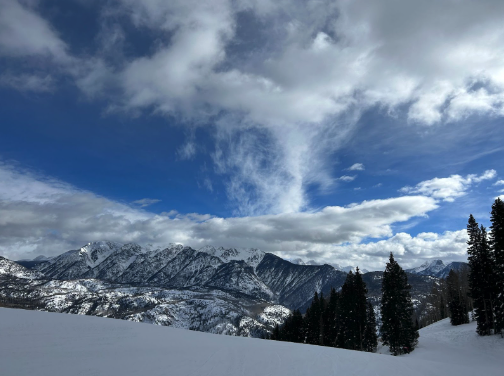Seasonal Depression: “I look forward to it ending”

Mountains across from the Purgatory Ski Resort during winter on January 29, 2023. Winter is the most common time for people to have seasonal depression because of the lack of sunlight.
During winter I just actively don’t want to do anything,” Haylen McMillion, a senior at DHS says as she speaks about her complications of having winter seasonal depression.
Mayo Clinic defines seasonal depression as, “a type of depression that’s related to changes in seasons.” Most people experience it during the winter months while others experience symptoms during spring or summer. Symptoms include extreme and consistent sadness, sleeping too much, low energy, difficulty focusing, loss of interest in daily life, weight gain and feeling hopeless all during a specific season or time of year. Loss of sunlight generally causes winter seasonal depression while summer seasonal depression is more likely to be caused by a drop in serotonin or changes with sleep. There is currently no way to prevent the symptoms or complications of this disorder but treatment includes things like light therapy (using a special light that mimics the sun) or medication like an antidepressant.
McMillion experiences feelings of being, “overwhelmingly tired, like I don’t want to go outside, I don’t want to get up…” and her symptoms include, “…anxiety gets worse…” and a “struggle with sleep.” These feelings begin, “…pretty close to Thanksgiving…just like the concept that winter is approaching really bothers me…” and end around, “April…[or] May…just because when rain starts instead of snow and I can…actively see things melting…[it helps it go away].”
When I asked how she was diagnosed she explained, “…it was more of a self-diagnosis at first…like I was really tired all the time and I don’t want to get up, it’s just really overwhelming for me…I didn’t want to do school…and so I was like ‘man, this is a common theme’ and I thought it was just a strong dislike…for winter…at first…and then I actually regularly see a therapist…and I started mentioning how overwhelming winter is for me…and she said ‘it’s not like an official clinical diagnosis…but I fully believe you have seasonal depression…’”
A lot of times the place you live can affect how bad your symptoms are, and when asked about living other places, McMillion said, “I lived in Durango and then I moved to Cortez two years ago, the winter is not as bad in Cortez, which actually slightly helped, because it’s a lot warmer there, it doesn’t snow as much.”
When talking about how she defines it for herself and the feelings that come with that she said, “It’s just something that I have.” She also said, “There is nothing really I look forward to [in winter]…I look forward to it (winter) ending.”
Rose Reiter, who is also a senior, has major clinical depression and has been “recommended some light therapy for the winter.” Her symptoms are “…lack of interest in things that I used to enjoy, difficulty finding energy, [and feeling] dejected/morose.” She said that, “in the winter I’m definitely much more exhausted…”. When explaining when she uses light therapy, she stated, “…while I do homework or read or scroll social media- anytime I’m in my room.” Reiter also said, “It acts like an extended daylight so I don’t lose my motivation once it’s 5pm and it’s pitch black.”
When talking about how it affects her on a daily basis, she explained, “The biggest thing my depression impacts is my social life. I can get through school, dance and my job, but hanging out with my friends after all that becomes a chore instead of fun.” For her, it begins “Once the light really starts to go away (November-ish)…and it usually ends around my birthday, end of February.”
She was diagnosed, “…when I saw a psychiatrist…added depression on top.” She defines depression for herself as a “…devil on your shoulder thing. My depression sits on my shoulder and constantly tells me what I do isn’t worth the effort I put in and constantly tells me I’m not good enough. I just try to tune it out…sometimes I’m successful, sometimes I’m not.” Reiter was also questioned about whether or not she is open about having it and she said, “…I’m not afraid to tell my friends what’s going on…”
Seasonal depression can affect anyone, although it heavily depends on the climate you live in. If you are struggling with depression there are many resources for you to get help including Safe2Tell, which is an anonymous way to report threats to you or others.













